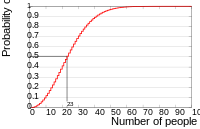
Photo from wikipedia
Engaging, focusing, and persisting in the completion of tasks are among the skills needed for school success. Tracking whether a child is learning cognitive problem-solving skills is essential in knowing… Click to show full abstract
Engaging, focusing, and persisting in the completion of tasks are among the skills needed for school success. Tracking whether a child is learning cognitive problem-solving skills is essential in knowing if they are acquiring skills important for development and school readiness; and if not, how they are responding to early intervention. Use of the Early Problem-Solving Indicator (EPSI) was documented by data for 2,614 children (6–42 months of age) collected by the early childhood staff from 45 programs. Results indicated that the EPSI was (a) scalable across programs, assessors, and assessment occasions, (b) reliable, (c) sensitive to growth over months of age, (d) comprised a dynamic continuum of skills within and across skills over time, and (e) moderated by children’s disability status but not gender or home language. Implications for research and practice are discussed.
Journal Title: Topics in Early Childhood Special Education
Year Published: 2022
Link to full text (if available)
Share on Social Media: Sign Up to like & get
recommendations!